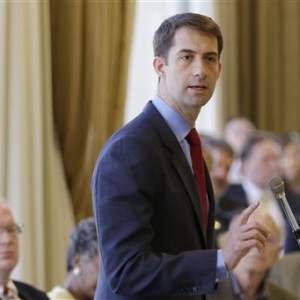Arkansas Republican Sen. Tom Cotton challenged Tim Cook on Monday over comments he made in support of Apple’s encryption policy during a recent interview, and said the CEO “omitted critical facts” about the technology on CBS’s “60 Minutes” Sunday.
“Apple is a distinctive company that has improved the lives of millions of Americans,” Cotton said in a statement Monday. “But Tim Cook omitted critical facts about data encryption on 60 Minutes last night”
During the interview Cook repeated Apple’s unwavering stance on providing end-to-end encryption over users’ communications that not even the company itself can access, and said the choice authorities are trying to put before Americans — safety or security — is a false one.
“I don’t believe that the tradeoff here is privacy versus national security,” Cook told CBS’s Charlie Rose. “I think that’s an overly simplistic view. We’re America. We should have both.”
The Apple CEO said there’s a wealth of personal information, beyond just communications, smartphone users should be confident companies work to keep private.
“There’s likely health information, there’s financial information,” Cook continued. “There are intimate conversations with your family, or your co-workers. There’s probably business secrets and you should have the ability to protect it. And the only way we know how to do that, is to encrypt it.”
Law enforcement, intelligence agencies and lawmakers in Congress have been pushing for back doors into such encryption since Apple announced it as a default service option last fall.
“There have been people that suggest that we should have a back door,” Cook said. “But the reality is if you put a back door in, that back door’s for everybody, for good guys and bad guys.”
The interview with Cook was taped before Islamic State-inspired attackers left 130 dead in Pairs, some of whom used encrypted messaging apps Telegram and WhatsApp to plan their attacks, authorities revealed last week. Rose said CBS caught up with Cook since the attack, and while he said Apple is cooperating with the government to combat terrorism, he’s not backed away from his position on encryption.
“He claimed that Apple does not comply with lawful subpoenas because it cannot,” Cotton wrote. “While it may be true that Apple doesn’t have access to encrypted data, that’s only because it designed its messaging service that way.”
The senator, who sits the the Senate Select Committee on Intelligence, repeated an argument made by FBI Director James Comey earlier this month that companies like Apple are willfully foregoing accessing to their encrypted services as a business model for marketing secure, uncrackable communications — not because its a technical impossibility.
“Lots of companies do it today — provide secure services and comply with court orders,” Comey recently said during a Senate hearing. “There are others who built their business models so that they say, ‘even if we want to, we can’t.’ The question of whether the answer is compelling them to do that by legislation is one that I can’t answer sitting here.”
Comey has since walked back his call for a technological back door for agencies to surveil communications through, and is instead lobbying Congress and the administration for a legal means of working with or compelling companies to comply with court orders for suspects’ communications, as telecommunications providers have traditionally done in the past
“As a society, we don’t allow phone companies to design their systems to avoid lawful, court-ordered searches,” Cotton said. “If we apply a different legal standard to companies like Apple, Google, and Facebook, we can expect them to become the preferred messaging services of child pornographers, drug traffickers, and terrorists alike — which neither these companies nor law enforcement want.”
Comey recently told Congress talks with Internet service providers on a solution to the issue of criminals and terrorists “going dark” online are ongoing — a progress report President Obama reiterated last weekend.
“It is very difficult for us to detect lone-wolf plots,” the president said during his year-end press conference Friday. “You don’t always see it. They’re not always communicating publicly.”
“One of the things we will be doing is engaging with the high tech community to find out how we can in an appropriate way… track a suspected terrorist.”
During Saturday’s 2016 Democratic presidential debate, would-be successor Hillary Clinton called on tech companies and government to work together on an encryption “Manhattan Project” — a reference to the secret private-public collaborative project that produced the first nuclear weapon in the 1940s.
“I would hope that, given the extraordinary capabilities the tech community has, and the legitimate needs and questions from law enforcement, there could be a Manhattan-like Project,” Clinton said. “Maybe a back door is the wrong door.”

